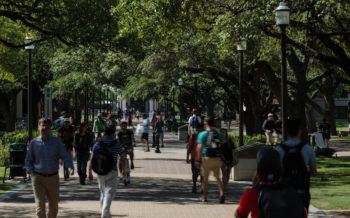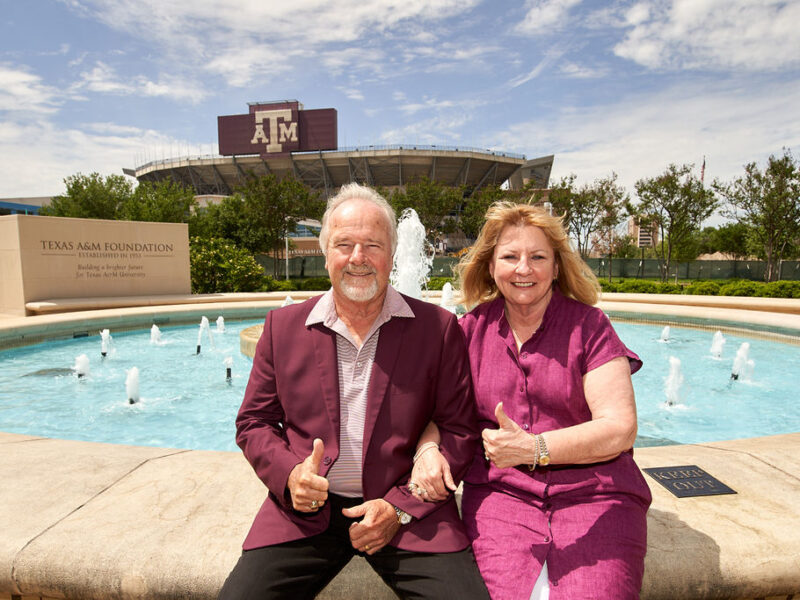
With the start of the new school year comes the beginning of a new era for on-campus student health services at Texas A&M University. University Health Services takes an integrated approach to health that prioritizes treating the whole person, with counseling, health, prevention and population health services working together with students toward a goal of achieving overall health and well-being.
University Health Services offers this approach to health by unifying the units formerly known as Counseling & Psychological Services and Student Health Services. But the result is much greater than the sum of its former two separate parts, says Associate Vice President for University Health Services Dr. Nancy Fahrenwald.
“As a whole, we’re doing more. We have more functional areas, more things that are integrated, and we’re focusing on expanded aspects of student health such as prevention, early intervention, and close collaboration across the entire spectrum of student services at Texas A&M and with key partners in the greater community,” Fahrenwald said.
University Health Services is a new and significant priority of the university’s comprehensive health science center, Texas A&M Health. Although the change officially took place in September 2022, major integrations have occurred over the summer to ensure zero gaps in services during times of high demand in the fall and summer semesters.
This careful approach allows students continued access to the same quality services on which they have always relied, including counseling and mental health care, primary and specialty medicine, emergency medical services, and both training and programming focused on prevention of the physical and mental health issues that college students experience. An important example of such programming is suicide awareness and prevention—a prominent focus area for University Health Services that will be especially active throughout Suicide Awareness Month this September.
Prioritizing Student Health
While efforts continue to streamline and coordinate existing offerings, University Health Services has introduced new services, with plans for more already in motion. Notably, additional mental health providers are being embedded at colleges, schools and remote campuses, including Fort Worth and McAllen, to provide easier access to behavioral health support. The student body has been advocating for embedded counselors for several years, says third-year law student Sarah Beth Sewell, who attends school at the Texas A&M School of Law in Fort Worth.
“Law school is a complete change. It doesn’t matter how adjusted you are in life and how good you are at school or how social you are, it is a whole new ball game. To have a mental health professional right there who understands law school and works with law students to advocate for you and to just talk through things is going to be a huge benefit,” said Sewell, who serves as a student ambassador in the admissions office. “When I’m giving tours in my role as an ambassador to potential students, to be able to look at them and say, ‘This university prioritizes you and your health so much that they have somebody right here,’ and to pass the office and say, ‘This is a full-time mental health professional’s office,’ the comfort that that gives potential students is really cool. I believe Texas A&M prioritizes its students and this is just one way I can tangibly point to that.”
In addition to embedded mental health professionals, a new mental health co-responder program in collaboration with the University Police Department has been introduced. This program will ultimately pair police officers with qualified mental health professionals who respond to emergency calls together. This approach provides officers with support when responding to individuals experiencing mental distress or exhibiting symptoms of substance abuse issues, providing assessment and diversion options to reduce unnecessary arrests and hospitalizations.
“We know we can do better for our students,” Fahrenwald said. “This change is about serving Texas A&M students in ways that will help them to be successful in their academic journey and in their lives. It’s an opportunity to rethink how things are.”
A Seamless Health Care Journey
University Health Services prioritizes holistic well-being, addressing multiple dimensions of a person’s individual needs. Population health needs are a priority, and the organization is strategically focused on early detection, screening, and both services and programming relevant to college health needs.
“We all remember the stressors associated with the transition to college; we’ve got to normalize that in a not-normal environment,” Fahrenwald said. “Our students are encountering new and challenging things that we need to give them the support to navigate. As a unified University Health Services, we are now better able to work together on identifying individual students and particular populations of students who could benefit from extra support to prioritize their health, and if needed, ensure they receive the necessary care or resources.”
Through University Health Services, a student who experiences a minor scooter accident on campus, for example, may utilize the Student Health Center (also known as the A.P. Beutel Health Center) to have any minor injuries examined for treatment. That examination includes a brief mental health screening, allowing the primary care provider to seamlessly connect the student with any appropriate additional services—like counselors or a behavioral health care manager.
A variety of care team members guide students throughout their journeys at University Health Services, helping them understand and access wellness resources and care options. Team members may guide students on necessary paperwork and the nuances of navigating insurance, all while helping them effectively communicate with other resources, if necessary. Team members also interface with additional student services at the university, helping to prevent disruptions in education and personal lives while addressing health needs.
“What we’re doing for our students is transformational. What we’re doing is the best of the best, and it’s what I think all of us would hope for in the best of holistic student health and health care. We have the opportunity now to do it in this community of Texas A&M, and that’s really exciting,” Fahrenwald said.



